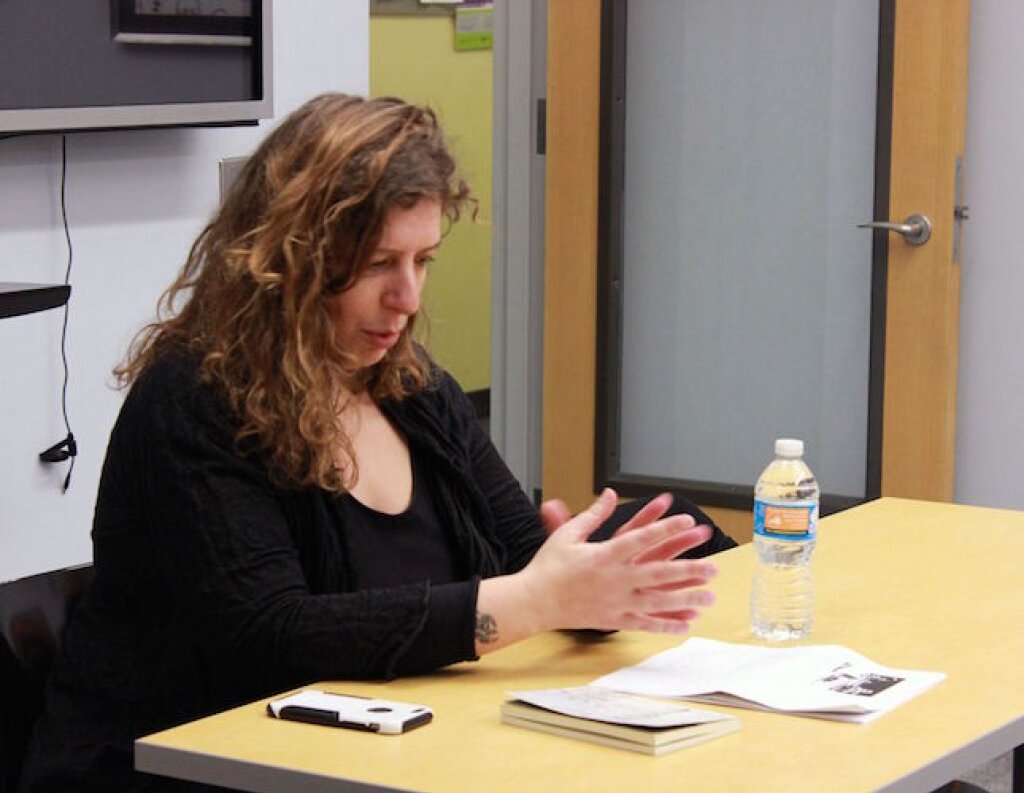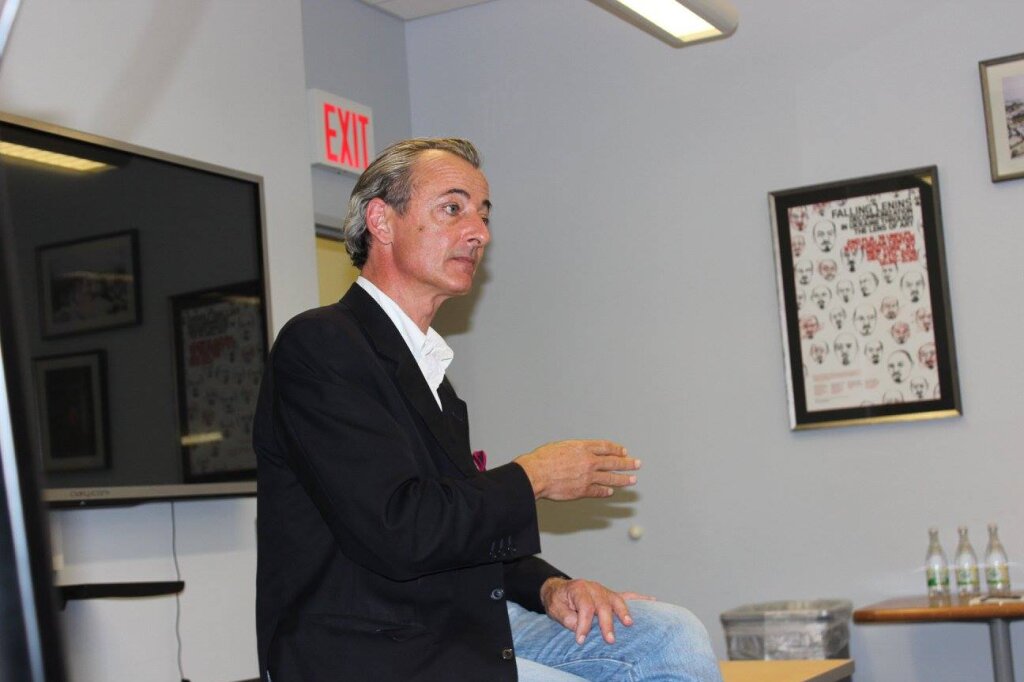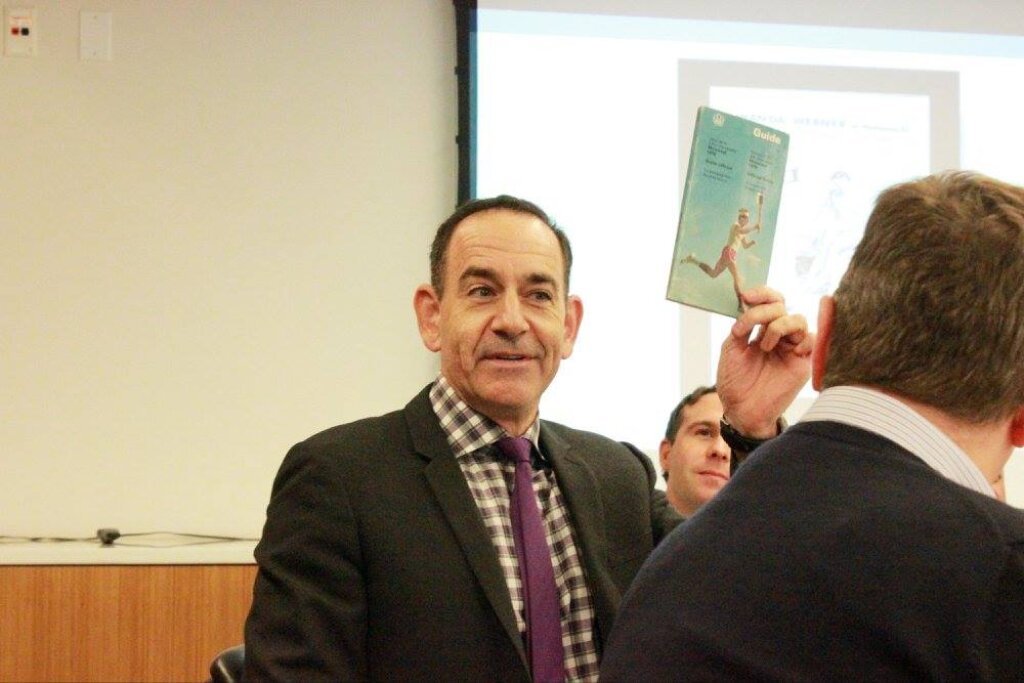Watch the video of the event here
On January 27, the Jordan Center for the Advanced Study of Russia welcomed Polina Barskova, Associate Professor of Russian literature at Hampshire College and short-term fellow of the Center, for the first event of the Spring semester, “Broken multivoicedness: poetries from the Siege of Leningrad.” Barskova is the author of eight books of poetry and one book of prose in Russian, and has most recently edited an anthology of poetry written during the Siege of Leningrad.
Noting the appropriateness of the date—January 27th being the anniversary of the lifting of the Siege (as well as Holocaust Remembrance Day)—Barskova started by stating that one of the most remarkable points binding the poems in Written in the Dark: Five Poets in the Siege of Leningrad (Ugly Duckling Press, 2016) is that “it’s kind of a mistake of history that we have these poems.” The poems included in the anthology, by Gennady Gor, Pavel Zaltsman, Dmitry Maksimov, Sergey Rudakov and Vladimir Sterligov, were not intended for immediate publication, and “escaped fire and destruction” to be discovered later, in the past ten years. Rudakov’s widow, for instance, attempted to burn the archive after she spent a couple of months in Kresty Prison, Barskova said. “This is the kind of story that follows almost every part of this book.”
Barskova offered two moments as “points of framework” to “open two larger directions of inquiry:” After one of her recent talks in Philadelphia, someone in the audience approached her and asked if the siege of Leningrad was over. This question stayed with Barskova, who then decided to include Written in the Dark in her course on contemporary Russian culture. If all the text in the book was discovered in the past 10 years, she asked, “in which canon does this poetry belong? In 1942, when it was written and nobody saw it, or now, when it has come to the readers?” This question, as Barskova noted, is a recurring one for 20th century Soviet literature, the works of which so often came to light decades after production. She sees the entrance of this particular set of poems into public discourse as difficult, but at the same time poignant and fascinating, Barskova said. Commenting also on the choice of “poetries” in her talk’s title, Barskova said “the kinds of poetry that emerged from the siege are so radically different, it’s problematic to see them as part of one corpus.”
Barskova handed out several poems to the audience. The first poem she read, “likely known to anyone who is ever studied Soviet poetry or been to Leningrad/St. Petersburg,” was by Olga Berggolts, one of the Siege’s “official poets.” The last line, Barskova said, has become a slogan of the siege commemoration and evokes “some form of historical comfort:”
We cannot recount their noble names here—
so many rest under the eternal protection of this granite.
But you who fix your attention on these stones, know this:
nobody, nothing has been forgotten
While this poem has been instrumental in constructing an official narrative of the Siege and is “very much about a production of ‘We,’” according to Barskova, “when [you] start digging deeper … you understand that every element of this comfort begins moving and different worlds begin lurking behind what you thought you knew.” One example: The Siege didn’t last 900 days, that number was 854. “Who decided to round up and why did everybody accept it?” asked Barskova. “Adopted for representational purposes,” the example of the number of days is “silly but symptomatic, for its lack of insistence on precision,” she said. Another example of numeric precision has to do with the number of dead. “Not only we don’t know but the range is very wide, Western historians estimate 600,000 and trusted historians in Russia give us 1.5 million. This difference in numbers informs us on how we know and remember, what sources we use. Once you enter the world of questionable knowledge things become difficult,” Barskova said.
Barskova then read a poem by Gennady Gor, heavy in references to cannibalism and devoid of abstractions. Reading Berggolts’ poem alongside Gor’s helps us understand her decision to speak of multiple “poetries,” Barskova noted. “Can these two poets be in the same situation and the same ideological language?” These questions then lead us to ask about what surrounded poetry in that historical context, specifically in terms of institutions. Barskova said she was surprised to learn that not only did cultural institutions continue to function during the Siege, but they actually worked even more diligently--especially censorship. Various media, too, continued to function, including both publication and distribution networks. Berggolts and Gor present a contrast not only in terms of content but also in terms of institutions: Berggolts could immediately publish poetry ("within hours," thanks to radio), while Gor's poetry would not be discovered for many decades. The media forms of the time were regular newspapers (Leningradskaya Pravda), military newspapers with literary and journalistic segments, but mostly radio (Radio Komitet), Barskova explained, where the strongest literati who didn’t leave the city worked. "Forbidden to switch off, in a dark city with no transportation, the radio always worked. ... Olga Berggolts was everywhere," so much that survivors still recall her voice as part of their memories of the Siege.
Nevertheless, Barskova said she also wished to "complicate the duality" presented by Berggolts and Gor. The former's siege diary, published a year and a half ago in Russian, allows for understanding "her various attempts to adjust to what she knew, [for which] she had to produce poetry that could be published." Berggolts was very much afraid during the Siege "with good reason" and buried her diary twice, Barskova said--all of which leads her to believe that "to say that she was only the voice of power and propaganda and strength is a radical simplification."
Another poem by Gor:
I ate Rebecca the girl full of laughter
A raven looked down at my hideous dinner.
A raven looked down at me like at boredom
At how slowly this human was eating that human.
A raven looked down but it was for nothing,
I didn’t throw it that arm of Rebecca.
Gor, who survived the Siege to go on to have a glorious Soviet career but never published any of his siege poems, is remembered in Russia as "the most boring sci-fi writer ever heard of” Barskova quipped. "Recreated after the siege," half of his siege poetry was written immediately after evacuation ("once he starts eating again"), but he then stopped writing poems until his death. This biographical trajectory leads Barskova to ask who these poets were: What united these "unofficial poets of the siege, people who knew what they wrote would never be published, who didn’t write to be published?" Although Barskova admitted to be simplifying by means of the "unofficial poets" category, she noted that only Dmitry Maksimov, a famous Soviet philologist, lived to see his siege poetry published, though in his 70s, under a pseudonym and in Switzerland.
The poetry scene in Leningrad was extremely active between 1927-1931, with readings, events and performances, but the situation changed when Daniil Kharms and Alexander Vvedensky were arrested for the first time: the world of these poets became an underwater world, Barskova explained. At the same time, she offered, “until recently we didn’t realize that when these central figures were [active], younger people were listening to them, learning from them. These are the people that found themselves in the Siege when none of the teachers were around anymore.” The influence of Kharms was particularly intense, according to Barskova, who said that two main events define Written in the Dark: the Siege and the disappearance of Kharms. In this way, “this is a study of genealogy. It is simultaneously a historical event of catastrophe and to what extent it can be turned into a language but also about avant garde language,” she observed. Each of these poets’ stories raises the question of their poetries’ survival, but paradoxically, “more and more poets of the Siege are emerging, more of these poems are coming to us,” Barskova said.



